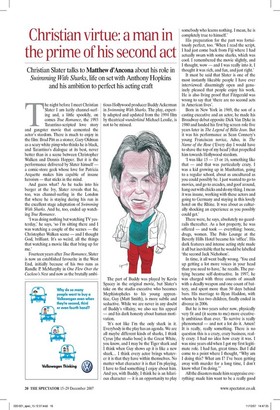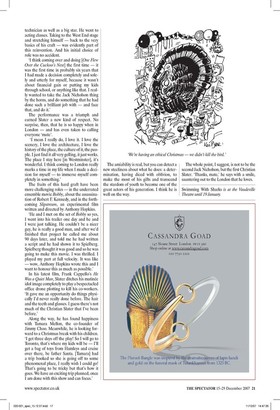Christian virtue: a man in the prime of his second act
Christian Slater talks to Matthew d'Ancona about his role in Swimming With Sharks, life on set with Anthony Hopkins and his ambition to perfect his acting craft The night before I meet Christian Slater I am lazily channel-surfing and, a little spookily, on comes True Romance, the 1993 Tarantino-scripted love story and gangster movie that cemented the actor's stardom. There is much to enjoy in the film: Brad Pitt as a stoner, Gary Oldman as a scary white pimp who thinks he is black, and Tarantino's dialogue at its best, never better than in a scene between Christopher Walken and Dennis Hopper. But it is the performance delivered by Slater himself — a comic-store geek whose love for Patricia Arquette makes him capable of insane heroism — that sticks in the mind.
And guess what? As he tucks into his burger at the Ivy, Slater reveals that he, too, was channel-surfing in the London flat where he is staying during his run in the excellent stage adaptation of Swimming With Sharks. And he, too, ended up watching True Romance.
'I was doing nothing but watching TV yesterday,' he says, 'so I'm sitting there and I was watching a couple of the scenes — the Christopher Walken scene — and I thought God, brilliant. It's so weird, all the things that watching a movie like that bring up for me.'
Fourteen years after True Romance, Slater is now an established favourite in the West End, initially because of his two runs as Randle P. McMurphy in One Flew Over the Cuckoo's Nest and now as the brutally ambitious Hollywood producer Buddy Ackerman in Swimming With Sharks. The play, expertly adapted and updated from the 1994 film by theatrical wunderkind Michael Lesslie, is not to be missed.
The part of Buddy was played by Kevin Spacey in the original movie, but Slater's take on the studio executive who becomes Mephistopheles to his young apprentice, Guy (Matt Smith), is more subtle and seductive. While we are never in any doubt of Buddy's villainy, we also see his appeal — and his dark honesty about human motivation.
'It's not like I'm the only shark in it. Everybody in the play has an agenda. We are all maybe different kinds of sharks, I think Cyrus [the studio boss] is the Great White, you know, and I may be the Tiger shark and I think when Guy shows up it is like a new shark... I think every actor brings whatever it is that they have within themselves. No matter what character it is that I'm playing, I have to find something I enjoy about him And yes, with Buddy, I think he is an hilarious character — it is an opportunity to play somebody who learns nothing. I mean, he is completely true to himself.'
His preparation for the part was fortuitously perfect, too. 'When I read the script, I had just come back from Fiji where I had actually swum with some sharks, which was cool. I remembered the movie slightly, and I thought, wow — and I was really into it, I thought it was rich, and fun, and just right.'
It must be said that Slater is one of the most instantly likeable people I have ever interviewed: disarmingly open and genuinely pleased that people enjoy his work. He is also living proof that Fitzgerald was wrong to say that 'there are no second acts in American lives'.
Born in New York in 1969, the son of a casting executive and an actor, he made his Broadway debut opposite Dick Van Dyke in 1980 and landed his first big screen role five years later in The Legend of Billie Jean. But it was his performance as Sean Connery's young Franciscan novice, Adso, in The Name of the Rose (Every day I would have to shave the top of my head') that propelled him towards Hollywood stardom.
'I was like 15 — 15 or 16, something like that — and that was particularly crazy. I was a kid growing up in Manhattan, going to a regular school, about as uncultured as you could possibly be. I just wanted to go to movies, and go to arcades, and goof around, hang out with chicks and do my thing. I mean it was insane, working with these actors and going to Germany and staying in this lovely hotel on the Rhine. It was about as culturally shocking an experience as you possibly could get.'
There were, he says, absolutely no guardrails thereafter. As a hot property, he was offered — and took — everything: booze, drugs, women. The Polo Lounge at the Beverly Hills Hotel became his 'office'. His dark features and intense acting style made it all but inevitable that he would be labelled 'the second Jack Nicholson'.
In time, it all went badly wrong. 'You end up getting a lot more voices in your head than you need to have,' he recalls. The partying became self-destructive. In 1997, he was charged with three counts of assault with a deadly weapon and one count of battery, and spent more than 50 days behind bars. His marriage to Ryan Haddon, with whom he has two children, finally ended in divorce in 2006.
But he is two years sober now, physically very fit and (it seems to me) more creatively ambitious than ever. 'To survive is really phenomenal — and not a lot do it. Amen! It is really, really something. There is no question this is a crazy, crazy business, really crazy. I had no idea how crazy it was. I was nine years old when I got my first legitimate role. I had fun, great times. But I did come to a point where I thought, "Why am I doing this? What am I? I've been getting away with murder for a long time, I don't know what I'm doing."
All the disasters made him reappraise everything: made him want to be a really good technician as well as a big star. He went to acting classes. Taking to the West End stage and stretching himself — back to the very basics of his craft — was evidently part of this reinvention. And his initial choice of role was no accident.
'I think coming over and doing [One Flew Over the Cuckoo's Nest] the first time — it was the first time in probably six years that I had made a decision completely and solely and utterly for myself, because it wasn't about financial gain or putting my kids through school, or anything like that. I really wanted to take the Jack Nicholson thing by the horns, and do something that he had done such a brilliant job with — and face that, and do it.'
The performance was a triumph and earned Slater a new kind of respect. No surprise, then, that he is so happy when in London — and has even taken to calling everyone 'mate'.
'I mean I really do, I love it. I love the scenery, I love the architecture, I love the history of the place, the culture of it, the people. I just find it all very gelling, it just works. The place I stay here [in Westminster], it's wonderful. I think coming to London really marks a time in my life when I made a decision for myself — to immerse myself completely in something.'
The fruits of this hard graft have been more challenging roles — in the underrated ensemble movie Bobby, about the assassination of Robert E Kennedy, and in the forthcoming Slipstream, an experimental film written and directed by Anthony Hopkins.
'He and I met on the set of Bobby so yes, I went into his trailer one day and he and I were just talking. He couldn't be a nicer guy, he is really a good man, and after we'd finished that project he called me about 90 days later, and told me he had written a script and he had shown it to Spielberg. Spielberg thought it was good and so he was going to make this movie. I was thrilled. I played my part at full velocity. It was like — wow, Anthony Hopkins wrote this and I want to honour this as much as possible.'
In his latest film, Frank Cappello's He Was a Quiet Man, Slater ditches his matinee idol image completely to play a bespectacled office drone plotting to kill his co-workers. 'It gave me an opportunity do things physically I'd never really done before. The hair and the teeth and glasses. I guess there's not much of the Christian Slater that I've been before.'
Along the way, he has found happiness with Tamara Mellon, the co-founder of Jimmy Choo. Meanwhile, he is looking forward to a Christmas break with his children. 'I get three days off the play! So I will go to Toronto, that's where my kids will be — I'll get a bag of toys from Hamleys and cruise over there, be father Santa. [Tamara] had a trip booked so she is going off to some phenomenal place, I really wish I could go! That's going to be tricky but that's how it goes. We have an exciting trip planned, once I am done with this show and can focus.'
The amiability is real, but you can detect a new steeliness about what he does: a determination, having diced with oblivion, to make the most of his gifts and transcend the stardom of youth to become one of the great actors of his generation. I think he is well on the way.
The whole point, I suggest, is not to be the second Jack Nicholson, but the first Christian Slater. 'Thanks, mate,' he says with a smile, sauntering out to the London that he loves.
Swimming With Sharks is at the Vaudeville Theatre until 19 January.


































































































 Previous page
Previous page